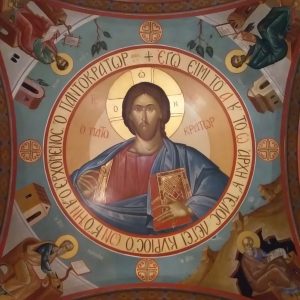Read through Psalm 4
This psalm can essentially be broken up into two parts in explaining our relationship with God: (1) verses 1-3 show that the LORD is a hearing God; and (2) because of this verses 4-8 show that we can ultimately put our trust in this LORD.
First, verses 1-3 open and end with two connected ideas: calling (v.1) and answering (v.3). Before we get to the peace we experience in our relationship with God (vv.4-8), the psalmist first describes what kind of God we are in relationship with (vv.1-3). He is a hearing God. Verse 1 opens with the plea, “Answer me when I call to you.” The psalmist is calling upon YHWH to give relief from distress and to show mercy by hearing his prayers (v.1). But this is contingent on who God is, “my righteous God” (v.1). The psalmist calls upon the mercy of God for help because he knows that He is a righteous God. Then verse 2 shows what ails the psalmist’s heart – attacks from his enemies (v.2a) and the state in which these enemies wrongly live (v.2b). They are ones who “love delusions and seek false gods,” or lies. But the psalmist is confident in being heard by God when he calls because “the LORD has set apart his faithful servant for himself” (v.3). So we can be confident in two things from verses 1-3: (1) we know that God hears us because He is “my righteous God”; and (2) He hears us because we are His elect (or “set apart” ones). All this shows YHWH as a God who faithfully hears His people.
The second part of the psalm (vv.4-8) shows us that because of who God is (v.1), we can ultimately put our trust in Him. This ultimate trust in the LORD culminates with our ultimate peace in life. Verse 4 begins with the imperatives to the people of God to “tremble and do not sin” and while they are in their beds to “search your hearts and be silent.” This may be an exhortation to the faithful to stand firm in their identity and to not live in a state of turmoil because “panic” or “confusion” before the LORD is the state that enemies live in, not the faithful (see 1 Samuel 7.10, ESV). After the faithful are found firm in their identity and state before the LORD, the psalmist then encourages offerings of the “sacrifice of the righteous and trust in the LORD” (v.5). Micah 6.8 tells us what proper sacrifice is pleasing to God, “He has shown you, O mortal, what is good. And what does the Lord require of you? To act justly and to love mercy and to walk humbly with your God.” It is through this full trust in the LORD that the psalmist declares of God, “Let the light of your face shine on us” (v.6; see the benediction in Numbers 6.24-26). This state of blessing from the LORD fills the psalmist’s heart with a new joy he has never before experienced (v.7); therefore, he can sleep in a state of peace and safety (v.8). This proclamation to sleep in full trust in the LORD is important because it is in sleep that we are at our most vulnerable. The psalmist says that he “dwells in safety” in the trust of the LORD even in his most vulnerable state. We have no control of what happens around us when we are in a state of slumber. The psalmist tells us that it’s okay because the LORD is in control and cares for us even while we lay down to sleep (v.8). Therefore, we can lay our heads down on our pillows at night in a state of peace that is so warm and secure like a baby coddled into the bosom of her mother as she rests in full protection, warmth, and peace.
Prayer: Father, thank you for who you are, “my righteous God.” Thank you for the state of peace we get to live and sleep in because of your grace. We wake each new day with mercies that are new every morning. Great is your faithful ear toward us LORD; you always hear us. Amen.
